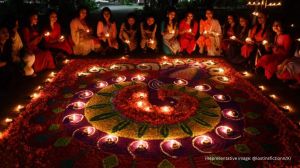The great family tree
A peep into a household in Rasoi village in Haryana,where five generations of a family live together
Munshi Ram is hard of hearing but ask him if he is a contented man at 103 and he draws heavily from his hookah and lets out a gummy smile. He is the patriarch who has managed to keep five generations of his family under one roof.
The family tree first found its roots here in Rasoi,a village in Haryana,when 10 brothers of Munshi Rams grandfather occupied 10 houses in a row in the village. For the next three generations of Munshi Rams grandfather,the family had only one male member each and they managed to stay on together.
Now,Munshi Ram,his son Raghubir,one of Raghubirs two sons and his family (son,daughter-in-law and grandchildren) live in the same housefive generations that live together despite perceptions that changed over time.
The centenarian Munshi Ram,though wobbly and toothless,is fit and goes about his day without depending on others,says his son Raghubir,72. He hasnt been diagnosed with any ailments,has a good appetiteloves desi ghee halwa and roti churmaand keeps an eye on his great great grandchildren. But its not entirely blissful. Raghubir says his father does get upset with the educated women at homedaughter-in-law of his grandson and great grandson who dont give a damn for the purdah and speak even when the men are at home.
He belongs to an era when women did not speak in front of men and wore the purdah. But my daughter-in-law and my grandsons wife call me dadaji and greet him too. He finds this unacceptable and nags them. But since he cannot hear their response to his rebukes,there is peace at home and five generations of our family are still together, says Raghubir. His wife died in 1987.
But while Munshi Ram is upset that the purdah isnt respected anymore,the village patriach,who married young and lost his wife in 1950,broke some barriers himself. A farmer,he sent his son Raghubir to join the Indo-Tibetan Border Police and helped his daughter-in-law raise her six children. He even enrolled four of his granddaughters in school before getting them married off. After Raghubir retired from the ITBP in 1995,Munshi Ram passed on the reins of the family to his son.
The ex-serviceman still consults his father on family and money matters and goes ahead only with the patriarchs approval. Like when the family sold their 12-acre agricultural land to private developers,TDI and Ansals. Raghubirs grandsons now run shops of mobile phones and electrical equipment in the village.
Munshi Ram doesnt have much of a say when it comes to eight-year-old Lakshya,his great,great grandson,and the other children. He doesnt approve of their eating noodles or running to the shop with 100-rupee notes. It shocks my father to see the way our children treat money. He makes his displeasure evident. If there no children at home he can advise,he sits on his chair on the street outside and doles out advice to anyone he meets, says Raghubir.
Lakshya,who was so named by his armyman great grandfather,Raghubir,after the Hrithik Roshan movie on the Kargil war,seems to be a fan of Munshi Ram. I already wear glasses,while his vision was so good till last year that he could recognise a man 100 yards away, he says. Munshi Ram smiles as the camera freezes his five generations together in one frame.



- 01
- 02
- 03
- 04
- 05




























